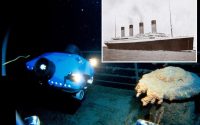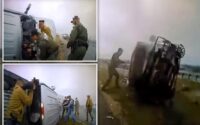Expert says WHO should not have dismissed COVID lab leak theory
A leading virologist advising the World Health Organization about the origins of the coronavirus pandemic said the UN agency should never have dismissed the lab leak theory in favor of China’s frozen food origin story.
Professor Marion Koopmans, who heads the department of viroscience at Erasmus Medical Center in Rotterdam, is one of 12 people investigating the emergence of the pandemic on behalf of WHO.
She said the theory that the virus escaped from a secretive lab in Wuhan could never be ruled out, telling the BBC podcast “Fever: The Hunt for Covid’s Origin” that that “ranking in retrospect was not smart,” the Daily Mail reported.
She added: “We shouldn’t have done that.”

In 2021, the agency announced after a group of scientists traveled to Wuhan that “all hypotheses remain on the table,” adding that “we have not yet found the source of the virus, and we must continue to follow the science and leave no stone unturned as we do.”
WHO, which ranked the likelihood of four popular theories, ruled that the natural-origins one was the most likely – and placed a leak from the Wuhan Institute of Virology as “extremely unlikely” and behind the frozen-food origin theory.
Beijing has floated theories that the virus began in a US research facility in Maryland or in imported frozen food packaging.

When asked whether she’d put both the frozen food and lab leak theories on an equal footing, Koopmans told BBC host John Sudworth that “neither of them are ruled out in my mind.”
Last year, a report by a WHO panel said all available data pointed to the coronavirus probably coming from animals, likely bats, a similar conclusion to the U.N. agency’s work after the 2021 trip to China, where the first cases were reported in December 2019.
“The strongest evidence is still around zoonotic transmission,” Marietjie Venter, chairwoman of the Scientific Advisory Group for the Origins of Novel Pathogens, said in June 2022, although the original host, intermediate hosts or how the virus jumped to humans are still unknown.

The mission had determined that the lab leak theory was “extremely unlikely,” though the team had stressed that additional study was needed.
In 2021, a classified US intelligence report delivered to President Biden also was inconclusive about the theories, including the widely-pushed one that the deadly bug jumped from animals to humans.
The intelligence community was unable to conclusively determine whether the virus had jumped to humans via bats or escaped the research facility in Wuhan.
“Everyone is biased, yes. I am biased for [the] natural origin [theory] because of everything we’ve seen in the past,” Koopmans saind on the podcast. “That’s such a known high-risk situation. So call me biased. But it’s also about probabilities. It’s not just about possibilities.”
Asked whether including the frozen food theory in the final report undermined WHO’s mission, she said: “I don’t think so.”
The expert added: “Again, as a scientist, looking at the literature and looking at what is possible, I felt we should also not throw it out because it was pushed politically.”


